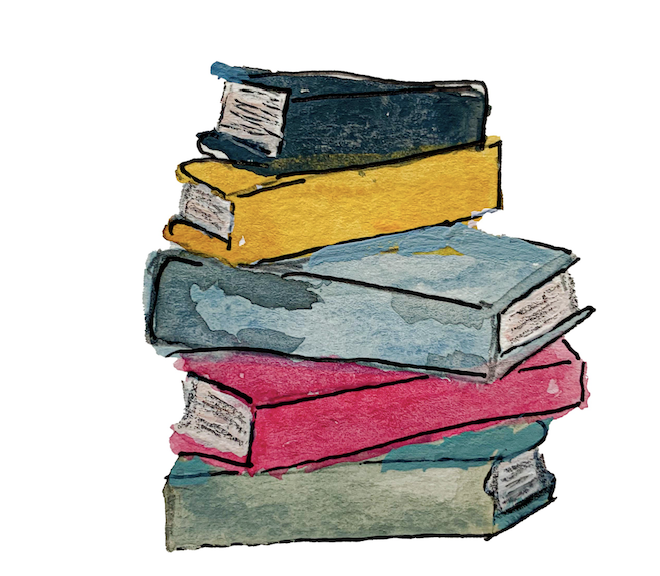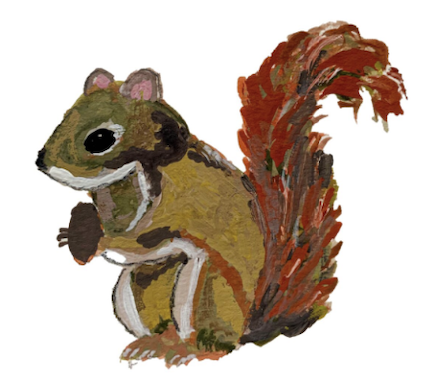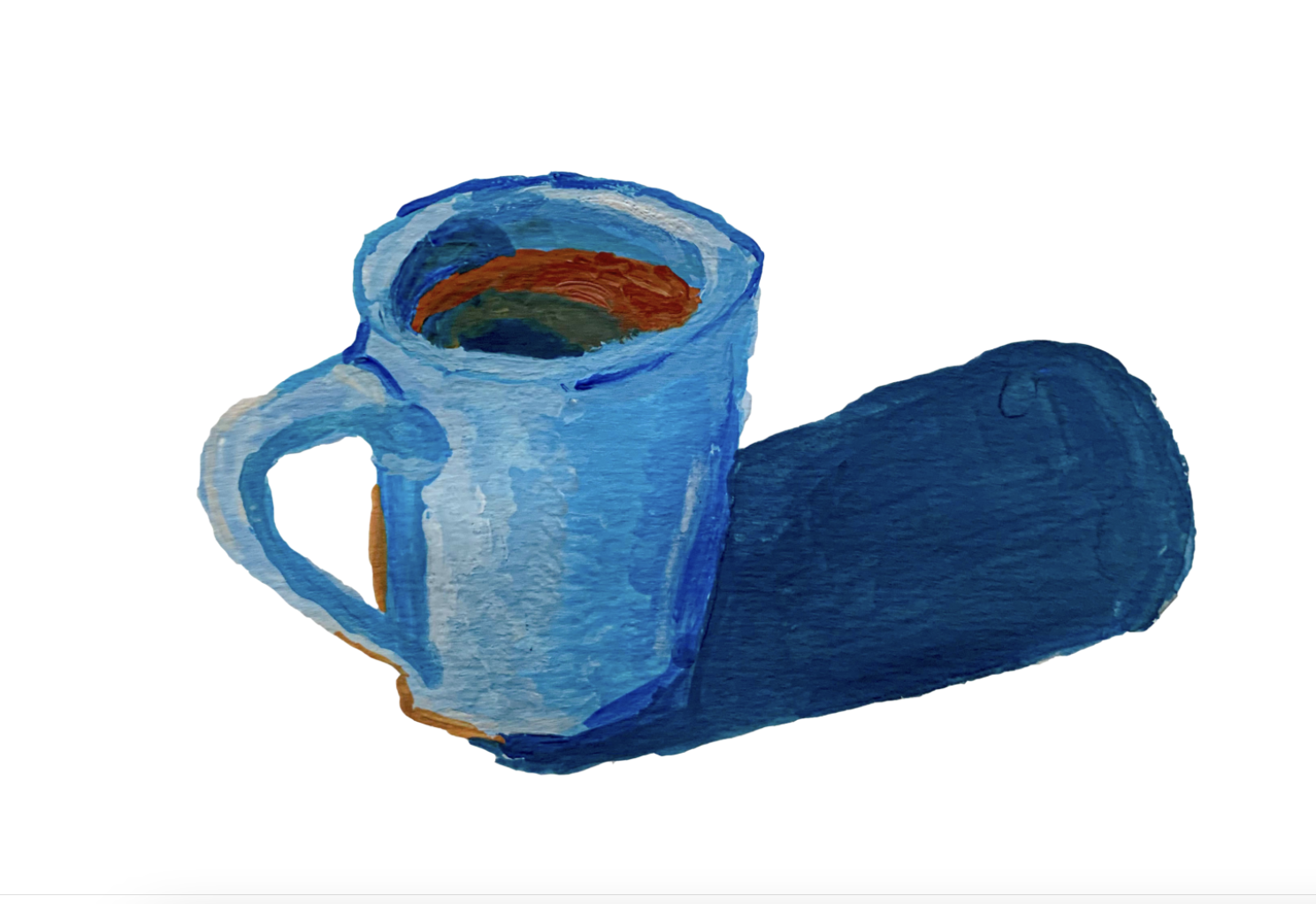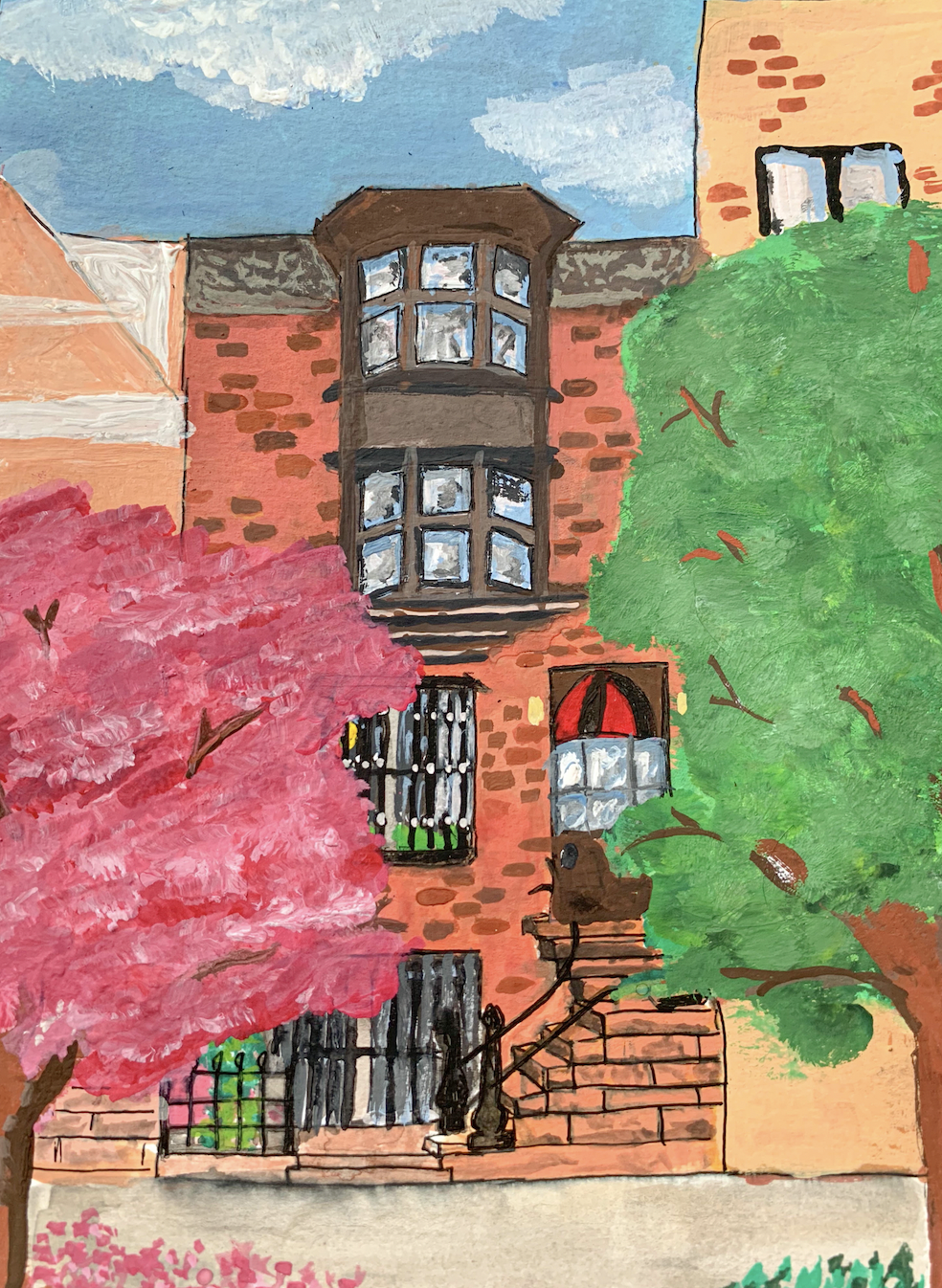Mid-March, 2020
Today I’m going home for the first time in months. I no longer notice the petunias just beginning to flower in the window boxes on Carroll Street, or the Corinthian columns flanking the entrance to the synagogue on Garfield. Without having to look, I lift my wheelie suitcase over a particularly big crack in the pavement outside my old orthodontist’s office. I’ve tripped over that crack enough times to know it’s there.
The sun dropping over the heads of the brownstones traces a golden path on the concrete, at the end of which, I know, is my parents’ house. “Parents’ house” is something I’ve only just started to say, a phrase picked up from college friends still waiting for the right place to give the word “home.” I’m lucky, I know where mine is—but I like “parents’ house” anyway. It gives me the same thrill as signing my name on a check, or tipping someone and saying, “keep the change.”
I know just how the house will be when I get there. The setting sun will draw the color from the bricks, a mosaic of pink and brown. The wind, still sharp with the last bite of winter frost, will rustle through the branches of the cherry blossom tree standing on the sidewalk next to our stoop. Across the street is my old elementary school, and the children will be laughing and screaming in the playground. There’ll be a “Welcome Home!” sign taped to the front door, the work of my younger sister, Ruby, who’ll be sitting by the window waiting for me.
I know just how I’ll be, too, when I get there. I’ll hug my parents, my mom first and then my dad an hour later once he’s finished his meeting. We’ll sit down at the dining room table and rehash things I’ve already told them on the phone. (“So you ended up getting lunch with that girl? Any potential there? Just give it time, honey.”) All of us will eat dinner together and talk about Trump’s press conference, about my parents’ work, and family friends who are having marital problems. (“Did you hear she’s leaving him? But they’ve got a baby on the way! Good thing she’s getting out while she still can.”) Tonight, when everyone’s asleep, I’ll walk into the kitchen to make myself a sandwich and feel the numbing dread of discovering a souvenir of my childhood in every drawer. A feeling of awful inevitability—the moment of quiet just before the doll in the horror movie starts to move. Here’s the plastic blue spoon I used to eat my first bowl of applesauce. The black neoprene lunch box from kindergarten with my name scratched on it in Sharpie. The photograph of me as a baby, my eyes wide and happy above a mask of chocolate icing.
At night I’ll fall into bed and my mattress will embrace me like an old friend. I’ll stare at the ceiling and start to feel that familiar feeling. A slackening, a lassitude. Water swirling and glug-glugging down a drain in my chest. I’ll make a promise to myself that this time will be different—I’ll go on a long walk tomorrow—at least three hours—but when I wake up it’ll be 11:00 and I’ll take out my phone and scroll through Instagram until the fog clears, and when I finally get out of bed the day will be half-gone and my slippers so comfortable and what’s the point in trying to do anything productive now anyways? I’ll walk into the kitchen and snap at my mom when she asks me how I slept. “Fine,” I’ll say, and pour myself a cup of coffee from the pot, without a thought as to how it had gotten there, or how come it’s noon and the pot is still full and still hot. “You always needed your sleep,” she’ll say. “Just like when you were a kid.”
Early-July, 2006
One summer when I was six years old, my parents packed us all into our scratched and dented black Mazda MPV and made the three hour drive up the Taconic to Hillsdale, New York. We were going to spend the month at my grandma’s old country house, a ramshackle structure of rotting wood and tacky shingles built on top of a cleared hilltop in the woods. By day, the house was full of magic. I sat by the window, transfixed by the hummingbirds hovering to drink from my grandmother’s bird feeder, and the lines of ants that came at lunchtime to collect the crumbs dropped from my fork. But when darkness fell, the night cracked open with the howls of coyotes and toads and owls hoo-hooing in voices like the one my mom gave to Voldemort when she read to us before bed. Then ghosts overtook the house. They groaned through the pipes and banged around the boiler room and creaked over the ancient floorboards. I could see them out of the corner of my eye as I lay in bed, silhouettes slipping toward me across the dark carpet.
Nearly every night when I couldn’t fall asleep, I’d clamber upstairs as fast as I could and knock quietly on my parents’ bedroom door. My dad was always awake, sitting up with his reading glasses perched on the tip of his nose, typing furiously on his computer. “Daddy,” I’d whisper, and he’d sigh and hoist himself out of bed and tramp behind me back down the stairs, just the way he did when I had nightmares at home. “I’ll sit here until you fall asleep,” he’d say and reopen his computer. In that halo of white light the ghosts fled, sliding back into the walls where their sounds couldn’t hurt me. Sometimes I think I’ve been chasing that feeling my whole life, the warmth I felt in the safety of his light.
Mid-April, 2020
I wake up every day by the glare of the sun. The first thing I do in the morning is reach for my phone to check the time. It’s been getting later every week: 10:30, 10:45, 11:00, 11:15. A couple weeks ago I decided it was okay to miss my morning Art History lecture. We’re not getting graded, and when will I ever need to know about post-Impressionist artists? People only care about the Impressionists anyway. Since then I’ve missed nearly every class. Instead, I watch YouTube videos until I can feel my bladder all the way down in my knees, and then I pad down the hall to the bathroom and hold a hand over my eyes to block the light while I consider whether it’s worth it today to put in my contact lenses.
In the month I’ve been back home, news of the Covid-19 pandemic has gotten worse. School has been canceled for at least the semester. I can count on one hand the number of people I’ve seen outside my family. The man at the deli who spreads cream cheese on my bagel. The guy with a nose ring who sells me weed. My neighbor, an elderly man with a pinched face and angry eyes who sits on his stoop all day feeding treats to passing dogs. (“What’s a human gotta do to get one of those,” I called to him once, on the way back from the deli with a bagel. He didn’t respond.) I’ve thought about texting some friends to go on a walk, but when I scroll through my high school contact list – Ananda, Henry, Jane, Trish – I start to feel queasy and decide to do it later, when I’m feeling more up to it. It’s not that I don’t want to see them. It’s just that doing anything at all feels too much to ask of myself.

My desk is a waiter’s tray of unwashed coffee mugs, cups and plates, my clothes a heap on the carpet. My bedside table is stacked high with journals abandoned after the second page. I take Zoom classes with the laptop screen tilted up toward the wall, so people don’t see the mess. I’ve come to dread our nightly family dinners because my dad will ask me if I’ve been outside that day. “You should take a walk,” he’ll say. “It’ll do you good.” “You just don’t get it,” I’ll huff, and pick at my food.
When dinner is over and my parents have gone upstairs, my brother, sister and I gather in the living room. Someone takes out a joint, a board game, or a bottle of wine, and for the night we’ll be three kids with everything except someone to tell us no. My brother Noah is the musician, and he grabs the aux. “Mellow or wild,” he asks, and we laugh and go “mild.” My sister Ruby is the chef, and she sections out the cookie dough. “No, let’s have brownies this time,” I yell from the living room. “Make your own fucking brownies,” she calls back. The streets slowly empty of night-owl dads walking their dogs; the security guard with a Mets baseball cap comes by to lock the school playground. Deep into the night the three of us stay up, playing Settlers of Catan and watching Game of Thrones. Nights like these, I remember why I love this place so much, why I find it so hard to stay away. But then night oozes into morning, viscous like cheap syrup, and I feel the water empty down the drain again.
On the sidewalk outside our house, the cherry blossom tree is in full bloom. Sometimes I take my breakfast out onto the front stoop, watching petals spiral down to catch in my hair. There’s a little kid who likes to play down on the street with his action figures – the grandson of one of my neighbors. When the wind gets to gusting the tree spills a swirling ribbon of pink petals over the road, and the little boy goes chasing after them, trying to land one on his tongue. I watch him play sometimes, sipping my coffee. It’s almost too easy to switch places with him. If I close my eyes, I can feel the hot concrete on the soles of my shoes, and the way the sweet smell of spring fires up my bloodstream, and the bitter taste of those cotton-candy petals, dissolving on my tongue.
Early-November, 2018
I’m sitting on a low stone bench in the Parco di Celio, overlooking the plaza and the sagging Colosseum lit up from within like a rotting jack o’ lantern. I’ve decided to take a year off before college, enchanted by the idea of discovering myself by discovering the world – a project which a couple weeks ago seemed as simple as buying a plane ticket. Tomorrow, I take the train north from Termini Station into Tuscany, where I’ll spend the next couple of months at a vineyard, picking grapes. I can’t think about it without my heart lurching precariously against my ribcage. But for tonight I’m in Rome, slowly eating a slice of pizza purchased from the first place I came across with English signs, trying to take in the glittering lights of the Colosseum without thinking about tomorrow.
On the way back to the hostel I hear the sinking, tinkling sound in my headphones that means my phone’s about to die- doo, doo, doo. I have no idea where I am, I’m using Google Maps to navigate, but each time I look down the battery is lower. 5%…4%…3%. How could I be so stupid? I start to run, squeezing around couples strolling hand-in-hand through narrow alleyways. Everyone is young and together in this city. I turn a corner and almost run over a lady with her dog. She yells something in Italian, but I don’t notice because there at the end of the street is the door of my hostel. I reach it just as my phone screen turns black.
My little room on the second floor is too dark to fall asleep. I try opening the curtains, but still the blackness is impenetrable and I can’t see my hand held out in front of my face. I reach over and turn on the flashlight on my charging phone, covering it partially in dirty clothes until the room glows softly with light.
The sounds drifting in through the open window are unfamiliar – the rattling of bicycle wheels over cobblestones and the strange inflections of foreign voices. I feel something hot and panicky rise up from my chest and stick in my throat, pushing up against the hollow beneath my Adam’s apple. How will I ever fall asleep like this? I close my eyes and picture what would’ve happened if my phone had died just a little earlier. Where would I have slept? Who would I have asked for help? Two months is such a long time to be away from home; everyone I need is too far away to help. They must all be asleep by now – out of reach.
Suddenly I sit up in bed. I’d forgotten about the time difference; it’s six hours earlier in New York. They’ll be at dinner, sitting together around the dining room table. I snatch my phone from beneath the pile of clothes and call my mom, forgetting to use Facetime to avoid the long-distance charge. She picks up on the second ring. “Hi McLovin!” she says, a joke so old I forget how it started. “Mom,” I whisper, as the pressure of the blackness suddenly lifts away. “Will you just talk to me for a bit?”

Late-April, 2020
Today I think I’ll go for a walk. I pack some peanuts in a Ziploc bag, grab a Jonathan Franzen novel and head out the door. It’s a still, lazy time of day, and the air feels heavy with the smell of an approaching rain. I set off down 1st Street and take a right onto 6th Avenue. Every street is colored with the emotional resonance of a memory. This corner is where I got bitten by my dog when he was still an untrained puppy, and here is the store where we get fresh matzah on Passover. I take a right on Sterling Street, pass the bench where I got drunk for the first time, another right onto 8th Avenue, stopping for a moment to take a sip of water at the synagogue where I had my bar mitzvah, dancing the horah with a girl I wanted to kiss. Another left onto Garfield Place, up the slope where I don’t go skateboarding anymore because I’ve fallen too many times, into the park and through a little opening in the trees, where the leaves are damp and thick underfoot, where the air is just as restless as me.
A little ways along a pond emerges, covered by a thick, green carpet of spring algae. I sit beside it on a damp log and take out the bag of peanuts, watching as the algae drifts back and forth over the water. A squirrel scampers down the trunk of a nearby tree and approaches me, his front leg extended as if reaching for something. He wants a peanut, I think. I toss a handful into the grass, but the squirrel ignores them. He’s staring at me, his head cocked. His eyes are black. We look at each other for a moment, and then I stomp my foot and he scurries back up the tree.
A patch of opaque water opens up in the algae before me. I lean over and my reflection rises up to meet me. I sense the algae drifting across the pond, forward and back, and the trees swaying in the breeze, and for a moment I feel the ground beneath me fall away. The big wet log is gone, the trees and the grass and the algae blend together into a smear of green, and I feel as if I’m tipping forward into empty space, into the pond. I clutch the log for support but my head is spinning from the heat. It strikes me all of a sudden how bizarre it is that the reflection in the water should be mine – my nose, my hair, my shapeless, chapped lips. I step back from the edge into the shade of the tree and lie down on the grass, trying to steady myself. Above me, the squirrel rustling through slender branches dislodges an acorn. It lands with a plunk in the water and sinks below the algae, out of sight.

On the way home the clouds rumble and finally let loose a torrent of rain. I haven’t packed an umbrella, so I decide to make a run for it, holding the nearly empty backpack above my head. Everything weeps silver pearls of rain – the leaves, the lampposts, the umbrellas bobbing above faceless people on 8th Avenue.
When I get to the top of my street, I pause. I have nowhere to go, and the rain is beating down harder, but I can’t go home. The thought of my room with its moldy coffee cups and unfinished journals is repulsive now. The sky is a wash of gray, the sun hidden behind a sheet of clouds. It’s funny to think how closely my life obeyed the movement of the sun only a few months ago. I hardly notice it anymore. Night is the turning of a switch, day the opening of a computer. The low branch of a cherry blossom tree dumps a soggy clump of white and pink petals at my feet, and I want to be anywhere else.
Late-February, 2021
I want to go home. I’ve been back at school for a month and everything is locked down. I’m sick of spending all day in my room with its peeling, tallow-colored walls, taking classes on my computer among a mess of plastic bowls and plastic utensils and paper coffee cups. I’m sick of scuttling through the fluorescent-lit tunnel beneath Cross Campus to the dining hall three times a day, where I have to sanitize before getting my food and the tables are fixed with plexiglass dividers. I’m sick of my cramped room, so small I hit my desk when I roll out of bed, I feel exhausted, overworked. I’m sick of my suitemates.
I miss the pressure of my shower at home, and the gurgle of my coffee maker, and the drawer next to the stove with all my favorite snacks. I miss staying in bed all morning, and getting up to my mom cooking breakfast in the kitchen, and the reliable clickety-clack of my dad’s typing. I miss laughing with my siblings all night. I miss having too much time to know what to do with.
Late-March, 2021
Fuck it. Shirt, pants, underwear, socks, toiletries, don’t forget contact solution, shove it into a backpack, bring tape in case it rips, uber to the station – ticket, purchased, activated – Can I see your ticket? Metro North train rattling southwest over wooden tracks, lifting my mask for a quick bite of rubbery Sbarro pizza, Grand Central station, shiny terrazzo floors give way to the familiar grit of the subway, shoving between rush-hour commuters on the downtown 4/5, this cannot be Covid-safe, switch to the 2/3 at Nevins Street, ride a puff of hot air out onto the platform, emerge into sweet pollen-scented air, 8th Avenue, petunias standing in a line above window boxes on Carroll, sheer white pillars on Garfield, mind the crack, bare branches of cherry trees, disrobed, delicate, a pirouetting ballerina without her tutu, children laughing in the playground, a sign taped to the door, Welcome Home.
I know just who I’ll be when I get inside, and I know just how quickly I’ll want to leave again. I oscillate between two competing versions of myself – the part that rebels against this place, who yearns to go wherever it is you go to feel and hurt, and to come home triumphant, and the part who needs to be here because I don’t know what it means to exist anywhere else. For me, home is a riptide. It lurks always just beneath the surface, pulling me backward in time, back to the child cocooned in a circle of white light. I don’t think I can escape it until I learn how to want to. Maybe that’s what it means to grow up.
— Jesse Goodman is an Executive Editor of The New Journal and a junior in Berkeley College.


